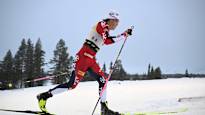In elite skiing, there has recently been a lot of enthusiasm and buzz about one substance, sodium bicarbonate, i.e. baking soda. Its use in skiing has been reported in numerous stories in the Nordic countries, among others Expressen’s, NRKand Ilta-Sanom with force. Norway’s skiing king John Hösflot Kläbo said she uses baking soda, as does the Swedish star sprinter Maja Dahlqvist.
Finnish men’s team coach Ville Oksanen told Ilta-Sanom in the first event of the cross-country skiing world cup at the Tour de Ski, that some of the Finnish national team athletes use baking soda. Finnish users include both sprinters and normal distance skiers.
Many people are familiar with the use of baking soda for baking, but what is its significance in sports?
Licensed nutritionist familiar with sports nutrition James Walrus tells that consuming baking soda reduces the acidity of the body. Baking soda can therefore improve performance in high-powered performances, where strong acidity is created.
Mursu has done more than 20 years of research, teaching and expert work at the university and with sports and athletes. He has been involved in creating, among other things, the first university studies in sports nutrition in Finland.
Mursu underlines a clear message when someone thinks about using baking soda while playing sports. Does playing sports fulfill the condition that the performance lasts from one to ten minutes and causes strong acidity?
– When I think about skiing, it must generate strong acidity. One form of training where baking soda can be useful is a few minutes of hard pulls. So is there any benefit in competition? Sprint skiing can be one such situation. If you are skiing the Tour de Ski or a single World Cup, the benefit is limited. In theory, it can be beneficial to go with higher power on a work section or uphill, Mursu opens.
According to Mursu’s understanding, there is no direct research evidence of the benefits of baking soda for skiing. He reflects on a general level that athletes rely on the methods used by other athletes and the benefits of baking soda have not necessarily been thought through carefully.
– It is difficult to determine benefit or disadvantage based on the list of results, Mursu states.
According to Mursu, research has been done on baking soda since at least the 1970s. Using it while playing sports is nothing new.
– Research has been done in such a way that a certain distance or amount of work is ridden on an exercise bike. It has then been found that performance improves by one to four percent. On average, it has gone to two or three percent, says Mursu.
However, according to him, the studies have usually been done on people other than elite athletes.
– Do elite athletes have lower percentages? Probably yes, says Mursu.
He describes that we are still talking about individual percentages of benefit.
– You can of course wonder how many seconds it takes and in theory the effect is significant, says Mursu.
Stomach problems as a side effect, doesn’t make sense for an exerciser
According to a licensed nutritionist, for a large part of people, the benefits of regular baking soda are watered down because it causes such strong nausea.
A couple of years ago, however, a new gel containing baking soda entered the market. Mursu has not been able to try it himself, but he has heard that it causes clearly less stomach problems. Because of that, the use of baking soda has also become more common.
– The biggest factor limiting its use is that baking soda causes stomach problems. It upsets the stomach, causes nausea, a feeling of thirst, the need to defecate and the like, says Mursu.
When we talk about the benefits of a few percent, the next question arises: Does a normal fitness person need baking soda in their everyday life? A licensed nutritionist’s answer is no.
– If the athlete’s training is of the described type, then why not try it. But I don’t see much sense in the average exerciser looking for a few percent performance advantage. In general, I would say no, Jaakko Mursu advises.
Knockout for talks about the “grey area”
Sanoma’s sports department has stopped using baking soda in Finnish skiing according to the stories they published faced with the sensitivity of the subject. According to Sanoma, some of the athletes have been visibly annoyed by the baking soda questions. Sanoma described in its recent story that the substance has been labeled as part of the “gray area” of elite sports.
A licensed nutritionist familiar with sports nutrition rejects this way of speaking and speculations about doping. In Jaakko Mursu’s opinion, baking soda should not be given a doping label, because there is none. He reminds that when talking about a doping substance, the substance should cause serious harm to health and distort competition. That’s not what baking soda does.
– I would like to underline that this is not a combination in a gray area. This is a permitted combination. It should also be treated that way. There is no need to hide its use or anything like that. Maybe they want to forcibly twist something like “this is a secret weapon” out of this, says Mursu.
